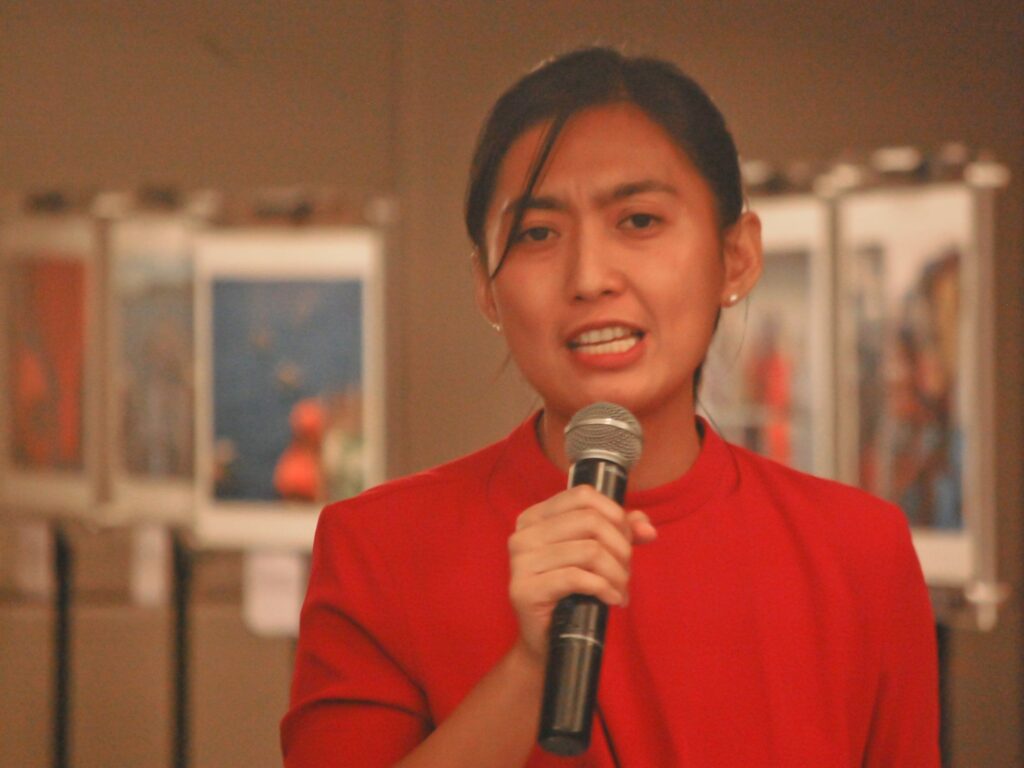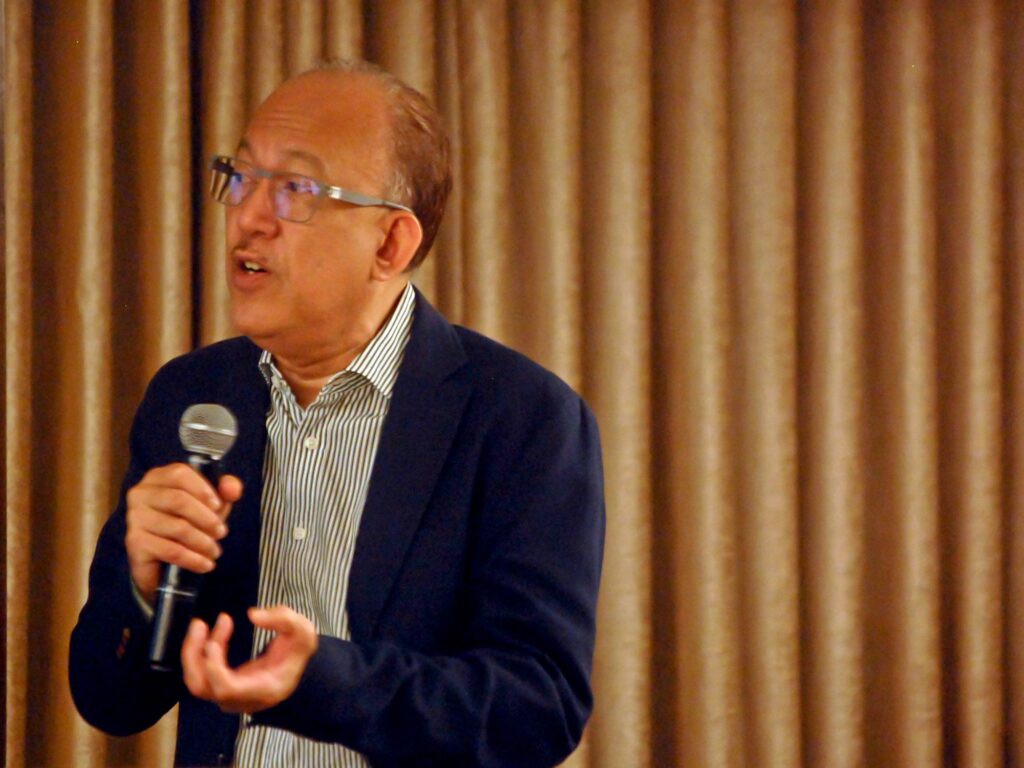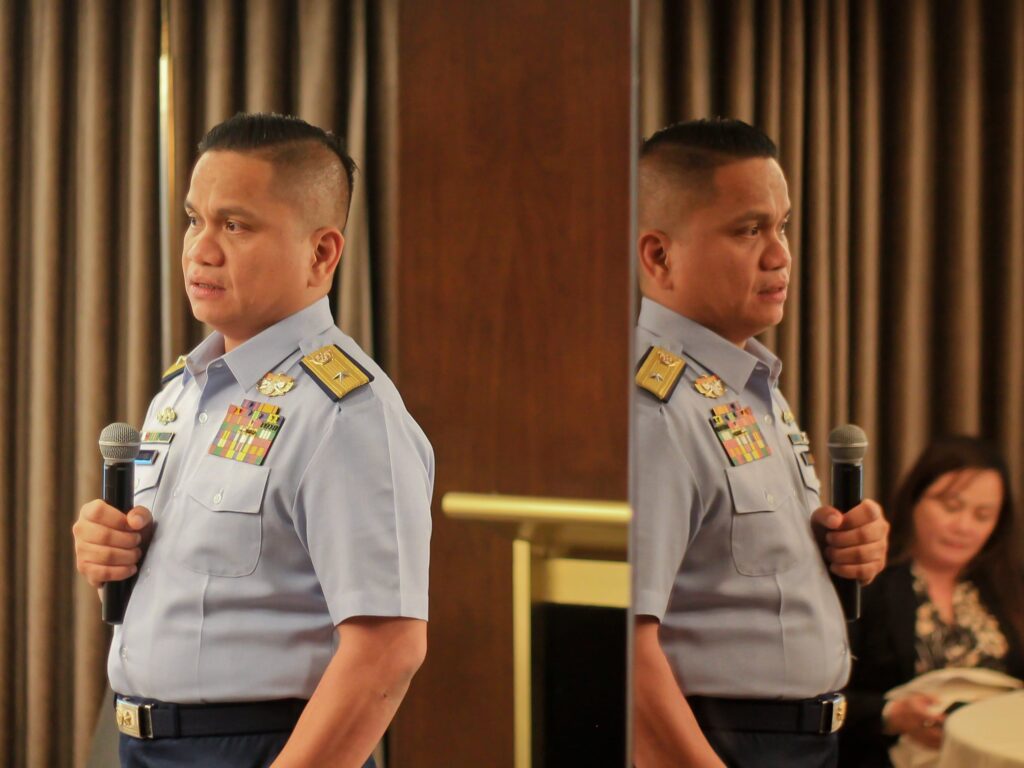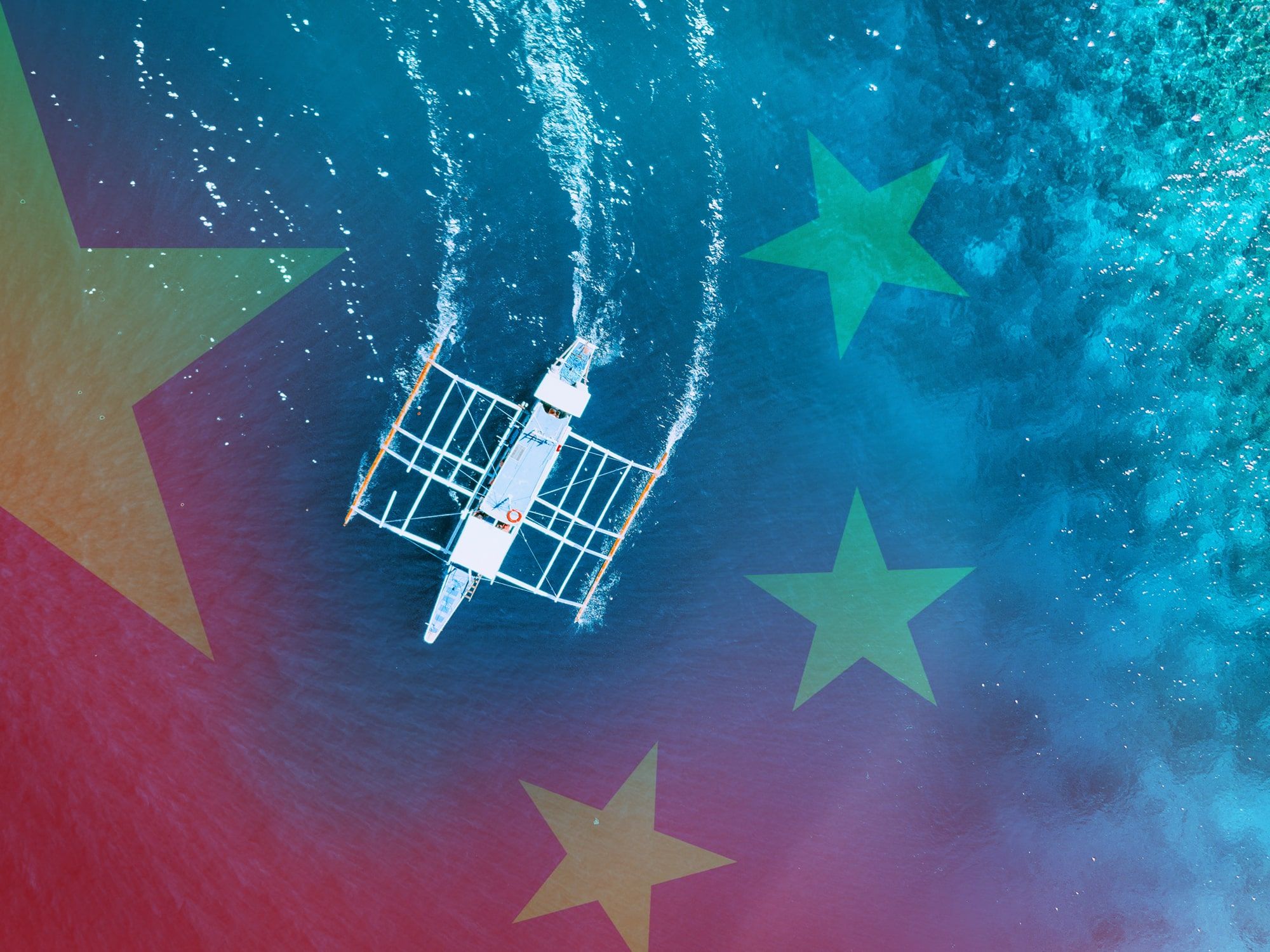The coalition discusses the importance of active citizenship while explaining how the whole Philippines can be affected by China’s maritime hostility.
On May 15, 2024, a convoy of Filipino civilians will attempt a task that has been endangering their countrymen for years: they’ll go to a place that they have the right to be in.
The location in question is Scarborough Shoal. Known to many as Bajo de Masinloc, it is a resource-rich, somewhat triangular formation of rocks and reefs in the West Philippine Sea (WPS.) The People’s Republic of China claims historic rights over this area through ancient maps. However, an international tribunal at the Hague ruled in 2016 the such documents have no lawful effect since they violate the prohibitions of the United Nations Convention on the Law of the Sea (UNCLOS) which the country signed and ratified. Furthermore, the tribunal ruled that the shoal is part of the exclusive economic zone (EEZ) of the Philippines. Still, China imposes its dominion over it by repeatedly barricading its entrance and meeting non-Chinese presence there with harassment and intimidation. It has even gone so far as to use powerful water cannons known for destroying property and injuring civilians.
Philippine fisherfolk, however, need the shoal. Families—particularly the ones based in Zambales—are dependent on it to make ends meet. This is why, come May, some of them will be there to fish in spite of potential Chinese harassment and they will be supported by the convey of the Atin Ito coalition.
“It’s a civilian supply mission,” said Rafaela “Paeng” David, the current president of the Akbayan partylist which is a member of the group. “This is for our fisherfolk at Scarborough Shoal.”
In Quezon City where Akbayan’s office is tucked behind the quiet facade of a residential community, David took part in a meeting with the Rotary Satellite Club of Fort Bonifacio Global City Titans. There, she explained the relevance of their upcoming mission by detailing how Zambales fishers operate.
“Ang itsura kasi nan ganito [This is how it is,]” she began. When fishers travel to locations like Scarborough Shoal which is about 239 kilometers away from Zambales, they tend to stay there for days to maximize their fuel usage. For the mission of Atin Ito (whose name roughly translates to “this is ours” in English,) the group intends to get to them in the middle of fishing and resupply them with fuel as well as other essentials. It’s a symbolic act meant to normalize civilian access in the area. It will also be done to remind the fisherfolk that they’re not alone in their struggle. Such measures are not at all unusual in the Philippines.
“That’s part of who we are,” David said in Tagalog. And history agrees.
In a country that is no stranger to natural calamities, difficult circumstances and controversial if not downright contentious leadership, civil society engagement has been instrumental in safeguarding the interests of the public (in support of or in spite of the state.) David said that one does not need to be a government official to cause societal change and this has been proven since the revolutionary fires that forged this archipelago into a country.
During the colonial period, for example, it was the initiative of locals that led to secret societies which cradled and eventually unleashed resistance against the abusive Spanish rule. During the Marcos dictatorship, meanwhile, various civil society organizations served as the backbone of the 1986 People Power Revolution which eventually returned democracy to the country. And, not long ago, during the administration of former President Rodrigo Duterte, civilian-led projects like community pantries were put up in response to the government’s shortcomings in ensuring public well-being following the economic setbacks of the coronavirus disease 2019 pandemic. And now, with fisherfolk of the Western coasts struggling to make ends meet due to the incursions of a foreign power, private individuals are once again uniting to take action.
“It is a peaceful process,” David explained; the kind of initiative Filipinos have been known for since the bloodless 1986 EDSA Revolution. But given what has happened in these waters, Atin Ito is prepared for those who won’t let it stay that way.
“We have strategies in place,” she shared, “whatever scenarios we have.”
In December 2023, just in time for the Christmas season, Atin Ito, composed of about 200 participants, embarked on a similar trip to other portions of the Philippine EEZ being claimed by China. They set off from Palawan eyeing to reach Philippine outposts in the WPS. Their goal was to donate supplies to the Filipino troops stationed there. Much of the convoy, however, was blocked; Chinese naval ships (including a destroyer) arrived bearing water cannons. According to David who was present in the trip, it was quite clear what they were there for.
“Kung tayo ang dala natin ay mga Christmas gifts, ang dala nila mga kanyon [If we had Christmas gifts, they had cannons,]” she said. “Kaya talagang makikita mo na may intention manakot, may intention mang-harass [You can really see that there was an intention to intimidate; an intention to harass.]”
The captain of M/V Kapitan Felix Oca which David boarded made the call to turn back after seeing the larger Chinese vessels. However, the mission did partially succeed. Through David’s orders, a smaller and faster boat carrying supplies for the Philippine convoy took a different route to sneak past the Chinese forces and deliver the goods to where they needed to be.
This was the first voyage of Atin Ito and given what they’ve witnessed in it, they’re hoping that it won’t be the last.

Rafaela “Paeng” David, President of Akbayan. IMAGE BY ANGELO CANTERA
The Price of “Peace”
What will happen if the Philippines continues to contest China’s claims in the WPS? There will be conflict which will lead to war which the Philippines—with an army less advanced than that of the China’s—will lose, and, many in the country will suffer.
This, at least, is one of the popular theories circulating online. And, its proponents range from pseudonym-bearing social media users to actual government officials funded by Filipino taxes. For Atin Ito, however, this estimation fails to recognize at least two points. The first is that war is far from being the only potential outcome given how costly it can be even for a country like China. The second? This idea that while war can cause suffering to Filipinos, tolerance of China’s current behavior in the WPS has already led to that. And according to Atin Ito, this can get worse.
The WPS is called as such by the Philippine government to properly identify parts of the South China Sea that belong to the Philippine EEZ. And, it is being monitored because it is vital to Philippine prosperity. In an article by the Philippine Information Agency earlier this year, the environmentalist group Tanggol Kalikasan underscored the importance of the WPS in the country’s food security.
“About 70 to 80 percent of the galunggong supplied to Metro Manila comes from that area,” said Asis Perez, the senior adviser of the group. “It is also one of the migratory spots of tuna in the country.”
Perez, who was also the former director of the Bureau of Fisheries and Aquatic Resources stated that the abundance of marine life in the WPS could significantly aid in the income generation of fisherfolk in the Philippines. Data from the Philippine Statistics Authority after all stated that the WPS produced an average of 304,586 metric tons of fish from 2018 to 2022. Meanwhile, data shared by David’s camp state that 30 percent of corals of the Philippines are in the WPS. 27 percent of commercial fish catch comes from it as well. There are also estimates, she added, that around 7 percent of the total fish production of the Philippines is sourced from this part of the sea. But reports claim that China isn’t just barring access to this marine wealth; it is also endangering it.
According to various sources, the rich biodiversity of WPS has been compromised partly due to Chinese presence. In 2020, for example, Dr. Deo Onda, a scientist from the University of the Philippines’ Marine Science Institute, estimated that the Philippines was losing about P33.1 billion annually from the damaged reef ecosystems in Panatag Shoal and the Spratly Islands. This is allegedly due to the reclamation projects China has been doing in the area. In 2023, the Philippine Coast Guard reported that coral reefs in Rozul Reef and Escoda Shoal were destroyed and it alleged that this was because of Chinese maritime militia vessels. In “Deep Blue Scars: Environmental Threats to the South China Sea” which was created by the Center for Strategic and International Studies, there are claims that the South China Sea has suffered extensive ecological destruction and this is due to the sand dredging and overfishing done by China. Ji Lingpeng, spokesperson for the Chinese Embassy in the Philippines denied this last February.
“Such a report is neither factual nor verifiable,” he said as quoted on an article by Newsweek. “Why are they so obsessed with harping on the same string?”
It’s partly because of what people see. “If you go to Zambales, hindi mo kailangan pumalaot, [If you go to Zambales, you don’t even need to leave the shore,] said David. “Kahit nandun ka lang sa shore, kitang-kita mo yung mga ships nila nagde-dredge [Even from the shore, you can really see their ships dredging.]”
Food security and the environmental issues aside, the state of the WPS may also affect the energy sector of the Philippines. According to the U.S. Energy Information Agency and Council on Foreign Relations, the controversial waters are estimated to have about 190 trillion cubic feet of natural gas and 11 billion barrels of oil. The Philippines and China were in talks of joint explorations but the partnership has been stalled as their maritime forces clashed. In the meantime, tensions continue as they have done so for years. And those mostly affected by this status quo are the frontliners of the WPS—from members of the Philippine Coast Guard to the Filipino fisherfolk; harassed, threatened and even injured by Chinese maneuvers.
Among the most high profile instances was the Reed Bank incident of 2019. The Chinese vessel, Yuemaobinyu 42212 apparently rammed an anchored Philippine fishing vessel F/B Gem-Ver, endangering the 22 lives on board the latter. Reports state that the Filipino fishers were then abandoned by the Chinese. They survived, however, after two members of the Philippine party managed to paddle for about two hours and seek the help of Vietnamese fishing vessel TGTG-90983-TS.
This is but one of the many incidents that stuck with the Philippine public, sparked civil society involvement and, eventually, led to the creation of Atin Ito.

Ronald Llamas, Chairman Emeritus of Akbayan. IMAGE BY ANGELO CANTERA
A Loose Gathering of Tightened Fists
When Atin Ito launched its first mission, it had more than 200 volunteers backed by various organizations. However, its gestation only involved a few people. Ronald Llamas, Chairman Emeritus of Akbayan was among those involved and at an event held by various Rotary clubs based in Makati and Bonifacio Global City, he explained that the idea was initially a loose concept among contemporaries. Aside from him, there was the late Albert del Rosario who was a former Foreign Affairs Secretary and Father Edicio G. Dela Torre, the current President and Vice Chairperson of The Philippine Rural Reconstruction Movement (PRRM,) a non-government organization. They all took note of the intensifying level of Chinese harassment in the WPS and wondered if there was something they can do to at least improve the situation of Filipino frontliners in this area.
Del Rosario passed away April last year, however. But, to honor him, Llamas and Dela Torre decided to push through with a project for the WPS and others (including the groups both men were part of) got involved. Thus, an alliance was born held together by a two-word battle cry: “atin ito.”
Formally launched October 2023, Atin Ito is a coalition of various organizations. These include Akbayan, its youth arm, PRRM, the Center for Agrarian Reform for Empowerment and Transformation, Pambansang Katipunan ng mga Samahan sa Kanayunan, Pambansang Kilusan ng mga Samahang Magsasaka, Team Manila Lifestyle and a number of local artists.
On its website, the group is defined as “a citizen-led campaign to honor our West Philippine Sea fisherfolk and frontliners.” Since its launch, it has been trying to live up to this through various projects.
At the center of its activities are civilian missions like the first one last December. To support this and give people a chance to get involved, the group mounted a months-long donation drive which even got support from big names. According to Llamas, these included Unilab which donated medicines and Both San Miguel Corporation and the Manny Pangilinan Group of Companies which donated canned goods. These efforts were punctuated by a concert on November 29, 2023 at the University of the Philippines Diliman where people also donated goods to be delivered to the frontliners. The mission was conducted shortly after but David said that they’re far from done.
During her interview on the popular Youtube channel of political journalist Christian Esguerra, she said that Atin Ito has an open-ended quality to it. “When we started it,” she said, “it was a loose gathering of different individuals, organizations na gusto lang magsama-sama at magambag dun sa gusto nating gawing misyon [individuals and organizations that only wanted to come together and contribute to the planned mission.]”
And now, as the next mission nears, it remains as such: an opportunity for people who wish to assist Filipinos struggling in the WPS.
This is seen in its current agenda. Recently, Atin Ito has begun preparing for its upcoming convoy and it has used its experiences during the last trip to better ensure success. This time around, aside from just bringing members of the media, the group also intends to bring in foreign observers to give them a better view of the struggles faced by fisherfolk in the country. This move was also done to give foreign parties a chance to show solidarity with the Philippines which is only one of the several countries that have issues with Chinese incursions. Furthermore, the group managed to update its donations wish list to better aid its beneficiaries. They refuse monetary donations but they are open to acquiring goods categorized into three: food items, personal and protective gear, and fishing equipment.
The group is also open to partnerships that are more extensive and sustainable. For example, those who might be capable of providing cold storage and trucks that fishers can use to transport their catch. “Kadalasan kaya nahihirapan yung mga mangingisda kasi wala silang sariling storage, wala silang sariling delivery [Fishers normally have a hard time because they don’t have their own storage unit or delivery trucks,]” David shared. “So, kung sino yung may-ari ng storage, sila yung nagdi-dictate ng price [so whoever can provide those for them can dictate the price of their fish.]”
Atin Ito believes that this will help the fisherfolk in the long-run—just like the group’s intention to educate the public. The WPS dispute is now a complicated issue and it has become one of the group’s missions to ensure that the public remains properly informed about it–in spite of those who wish them not to be.

Commodore Jay Tarriela of the Philippine Coast Guard; IMAGE BY ANGELO CANTERA
Rocking the “Cradle of the Brave”
The WPS has long been a source of friction between China and the Philippines. But, tension between the two countries significantly escalated back in 2012 and it’s because of Scarborough Shoal
According to Llamas who was then part of the administration of former Philippine President Benigno Aquino III, Chinese poachers were spotted in the area illegally collecting clams and tortoises. Other reports say that these Chinese vessels were also taking sharks and corals. The Philippines tried to apprehend them but the Chinese sent their coast guard and navy to prevent arrests leading to a high-tension standoff felt across the continent.
After this, Aquino sent Llamas to China to discuss what happened. In a meeting he recalled asking China’s representative this: “We’ve been boarding each other’s ships for decades,” he recalled saying. “Why is it now that when this happened, when we arrested your poachers, it appeared as if you are going to war against us?”
“We are now a superpower,” was apparently their response. “You can no longer do that to a superpower.” To Llamas, it appeared that the standoff was all about China’s desire to save face.
“Yun yung first encounter ko sa Communist Party of China [That was my first encounter with the Communist Party of China,]” he shared. And his assessment of the meeting being a failure became clear. Soon after, the Chinese scaled up its harassment in the WPS forcing the Philippines to try another tactic: it sued.
The Philippines filed a case against China at the Hague. The ruling was rendered by an arbitral tribunal constituted under Annex VII of the UNCLOS. The Philippines prevailed. Among the notable points of this victory declared that China has no legal claim over waters and resources within the Philippine EEZ. The ruling also didn’t recognize an ancient maps which China uses to claim most of the South China Sea. But this was not enough to force the country to ease up—especially since it found an ally in Aquino’s successor.
As a spokesperson of the Philippine Coast Guard, Commodore Jay Tarriela has encountered some difficulties because of the presidency of Duterte. And together with Llamas, before a crowd of Rotarians, he shared some of his misgivings.
“During the time of President Duterte,” he said, “we decided to have a much more closer relationship with the People’s Republic of China.” And this, in his mind has compromised the country’s standing in the maritime dispute.
When Duterte was campaigning for the top seat in Malacanang, he promised to vehemently defend the Philippines’ EEZ from foreign powers. He even went so far as to say that he would ride a jetski to personally plant a flag at the Spratly Islands. Flash forward to 2021, years into his presidency, Duterte called that promise a joke as his presidency was submerged in criticisms over stance regarding the WPS issue.
For starters, he undermined the Hague ruling on several occasions; he even went so far as to refer to it as just a piece of paper that cannot be enforced unless the Philippines goes to go to war against a state it cannot beat. This isn’t true, according to Retired Supreme Court Senior Associate Justice Antonio Carpio.
“I have already said this many times,” he stated during an interview with One News PH back in 2021, “There are many ways to enforce the ruling without going to war. Kasi ang utak pulbura, sasabihin lang gyera. Hindi pwede [People who tend to resort to violence will only say ‘war.’ That can’t be.]”
In the program, he suggested having a convention with Vietnam, Brunei, Malaysia and Indonesia (other countries who also contest China’s claims in the South China Sea.) They may adapt the ruling, have other countries sign in on it and turn that into a law which the other countries can invoke in defending their own EEZs. He also suggested joining freedom of navigation and overflight operations of the United States and its allies since such operations prevent China from further enforcing its supposedly historical claims in the WPS. The Duterte administration, he said, wasn’t even welcoming of such operations. This is in line with that presidency’s decision to water down ties with the US in favor of a better relationship with a country the Philippines is currently in a maritime dispute with. Such political moves however didn’t stop the harassment of WPS frontliners.
“The Chinese Coast Guard [continued] to harass the Filipino fishermen,” Tarriela said. “The Armed Forces of the Philippines are still unable to complete their supply mission in Ayungin Shoal. And the Philippine Coast Guard is still also having trouble [maintaining] our presence in our own exclusive economic zone.”
But Duterte isn’t the only high profile individual accused of being too lenient with China. His daughter, the current Vice President and Education Secretary has also been implicated. Normally vocal about the subject of national security and love of country, Vice President Sara Duterte has been noticeably quiet about Chinese harassment in the WPS. And when she finally did talk, her statement can be summed by two words: “no comment.” This did not sit well with people. Among her critics was David.
“Vice President Sara Duterte’s ‘no comment’ remark on China’s acts of violence and harassment against Filipinos in the [WPS] epitomizes the most traitorous two words uttered by the second highest leader of the land,” she said in a statement.
“It echoes the dangerous depths of her allegiance to China over the well-being and dignity of the Filipino people.”
With the Dutertes being implicated, the family’s usual chorale of online supporters mobilized to mostly spread misinformation and propaganda. Some echoed the older Duterte’s claims about the Hague ruling while others, according to Tarriela, sought to malign the current administration.
In spite of his testy relationship with progressive groups like Akbayan, President Ferdinand Marcos Jr. does have a few things in common with them. For example, he too believes that the country should have a tougher stance against China, proclaiming during his first State of the Nation Address that he does not wish to give a single square inch of the country’s EEZ to the foreign power. Among the strategies of his presidency involve strengthening diplomatic ties with the United States and other countries currently critical of China’s behavior in the WPS. He wants the country, however, to do this while dealing with the aggressor in a professional manner. This means that even if the Philippine Coast Guard is equipped with water cannons, they are encouraged to not use them at the face of Chinese provocations.
Another strategy, involves relying on information dissemination which seeks to expose China’s aggression in the WPS to both the Filipino people and the international community. This is why he isn’t opposed to the works of Atin Ito even though his father’s dictatorship was brought down by the engagement of civil society back in the late 80s.
“It is the obligation of the Philippine government to inform the Filipino people of what’s happening in the West Philippine Sea,” Tarriela said. “Therefore, we support the civil society to have this kind of initiative.”
Online, however, such strategies have been lambasted by the people Tarriela calls “trolls” loyal to the Dutertes. They called the Marcos admin’s strategies warmongering, undiplomatic and anti-Filipino because of how they may incur the wrath of the Chinese and plunge the country into war. Some also say that these strategies are backed by the Americans in a bid to provoke the Chinese and diminish the latter’s control in the South China Sea. And then there are some who have even gone so far as to dismiss the grievances of the people victimized by China’s harassment.
They’d make or share statements that downplay the capacity for damage of water cannons or use selective images and videos from Chinese propaganda websites to claim that the water cannon tactic was overly sensationalized.
They continued to do this even after Philippine media organizations actually joined supply missions and released footage from inside Philippine vessels as they are being hit by water cannons. Such claims persist even as the world sees powerful blasts of water tearing through the interiors of Filipino ships as though they’re being ravaged by a storm.
In a video released last March by GMA Integrated News, the crew members of a ship conducting a resupply mission at Ayungin Shoal could be seen incurring injuries because of these sprays; vomiting because of the water and calling for medical attention in the midst of the chaos. A crew member was even seen highlighting the injury to his eye while another was bemoaning damage to his property.
Still, China claims that it is in the right in conducting such attacks; that their coast guard was merely behaving within the parameters of lawful conduct at sea. It also doubled down on its claim that most of the WPS including Ayungin Shoal is theirs in spite of what the international community ruled at the Hague.
“We need to make a stand to make [sure] the Filipino people [are] not swayed by misinformation,” Tarriela said. “We need to prepare for the upcoming election by 2025. We need to make sure that our elected officials by 2025 and 2028 will no longer be those people who never really cared about our sovereignty, our sovereign rights, and jurisdiction in the West Philippine Sea.”
Atin Ito agrees. Back at David’s office, she and Akbayan Youth’s Khylla Meneses outlined a strategy meant to counteract the Chinese narrative. While discussing a photo exhibit of their first mission (now mounted in mobile frames,) they talked about possible school tours and the letters they’ve already written to various institutions to begin this. These tours, to be done with representatives of the Philippine Coast Guard, will seek to demystify the issue of the WSP and inform people how they can help.
“When we do the school tours,” David said, “it is crucial for us to raise awareness among young people again, to counter the propaganda that pro-China groups are championing.” She added also that these tours are important because—in spite of narratives claiming that war and the subsequent defeat of the Philippines may occur soon if China continues to be defied—they believe that this has the potential to remain as an intergenerational issue with a variety of possibly endgames.
For example, the Chinese could eventually realize that they cannot simply bully Filipinos out of their EEZ. This, at least, is what Tarriela wants. “I just hope and pray that the Chinese, People’s Republic of China in particular, the government, not the people, would eventually adhere to the international law,” he said. “[I hope they] would respect our sovereignty and sovereign rights.”
And if they refuse to relent, Llamas has a number of other hopes. For instance, the possibility that the Chinese people—through the transparency of the Filipinos and the support from the global community—would recognize the faults of their government. “Hindi ko inaalis yung possibility na yung ganitong klaseng suporta ng mundo ay mag-create ng contradiction mismo sa loob ng China, [I’m not dismissing the possibility for international support to create contradictions within China itself,]” he said. “Lalo na kung yung gobyerno ng China ay kino-control yung kanilang bansa sa pangamagitan ng pwersa. [Especially since China controls its population through force.]”
He believes it’s possible for the Chinese people to find common ground with the Filipinos who are also being bullied by the Chinese government. Perhaps, he said, this could lead to a shift from within the country itself.
Regardless of how it ends, though, David believes that it will be a long journey. “It’s not gonna be fixed overnight,” she said before turning to Meneses and saying “kaya napakahalaga ng mga kabataan, [that’s why the youth are important.]”
Someone in history once said something similar. He too recognized the struggles of his country under an oppressive regime so he acted in its defense through peaceful means and he did so at the expense of his freedom, safety and, eventually, life. There were many like Jose Rizal in his time and there were many after—civilians who went out of their way to further the rights of others. Doing so came at great cost to a number of them but they did so anyway and such resolve led to the formation of a nation capable of resistance.
“Sabi nga natin sa national anthem… tayo ang duyan ng magiting [As it is said in the national anthem… we are the cradle of the brave.]” David said. And she believes that there is already sufficient proof of this even before they test the waters come May. “The frontliners,” David noted; the fisherfolk, coast guard and marines–people whose safeties are at risk in places they have the right to be in.
EDITORS NOTE: For more information on how to donate to Atin Ito, visit their website: https://www.atinito.info/



